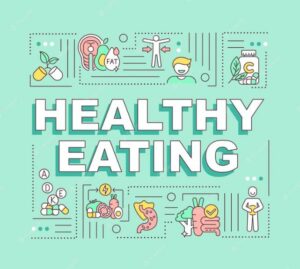Healthy Eating Habits
- Dr Owais Rafiq
- September 28, 2023
- 8:52 pm

Healthy Eating Habits: Building a Foundation for a Healthier Life
Healthy eating habits are important for adults of all ages. Whether you’re a college student, a working professional, or a parent wanting to improve your family’s well-being, adopting a balanced and nutritious diet can greatly impact your overall health. In this blog, we’ll explore the importance of healthy eating habits, provide practical tips on how to develop them, and highlight the many benefits they offer.

Importance of Healthy Eating Habits:
Healthy eating habits provide our bodies with the fuel they need to function optimally. Good nutrition can increase energy levels, improve focus and concentration, support a healthy immune system, and reduce the risk of chronic diseases like heart disease, obesity, and diabetes.
10 Tips for Healthy Eating
Here are 10 simple and easy-to-follow healthy eating habits:
- Eat a Variety of Foods: Include fruits, vegetables, whole grains, lean proteins, and healthy fats in your diet. Each food group provides different essential nutrients, so aim for a diverse range of options to ensure you’re getting a balanced diet.

- Portion Control: Be mindful of your serving sizes to avoid overeating. Use smaller plates and bowls, and pay attention to your body’s hunger and fullness cues. This can help prevent consuming excess calories and promote weight management.

- Fill Half Your Plate with Fruits & Vegetables: Fruits and vegetables are packed with vitamins, minerals, and fiber. By filling half your plate with these nutritious options, you can ensure you’re getting a good amount of essential nutrients.

- Choose Whole Grains: Opt for whole wheat bread, brown rice, whole grain pasta, and oats. Whole grains are higher in fiber and provide more nutrients compared to refined grains. They can help regulate blood sugar levels, promote digestive health, and contribute to overall well-being.

- Include Lean Proteins: Lean proteins such as chicken, fish, beans, lentils, tofu, and low-fat dairy products are excellent sources of protein without excessive amounts of saturated fat. Protein is essential for building and repairing tissues and helps you feel full and satisfied.

- Limit Added Sugars: Minimize your consumption of foods and beverages that contain added sugars. These include sugary drinks, desserts, candies, and processed snacks. Added sugars provide empty calories and can contribute to weight gain and various health issues.

- Reduce Unhealthy Fats: Minimize saturated and trans fats found in fried foods, processed snacks, and high-fat meats. Instead, opt for healthier fats like those found in avocados, nuts, seeds, and olive oil. These healthier fats can support heart health and provide essential fatty acids.

- Stay Hydrated: Drink plenty of water throughout the day to maintain hydration. Water helps with digestion, nutrient absorption, and overall body function. Carry a water bottle with you and sip water regularly.

- Cook at Home: Prepare your meals as much as possible. When you cook at home, you have more control over the ingredients used and cooking methods. This allows you to make healthier choices, use fresh ingredients, and limit added fats, sugars, and sodium.

- Avoid Screen Usage: Limiting screen time during meals can promote mindful eating, reduce distractions, and improve digestion, leading to better overall health and enjoyment of food.

Healthy eating habits are essential for adults looking to enhance their well-being and lead a healthier life. By following these guidelines and incorporating them into your daily routine, you can build a strong foundation for improved nutrition.
Disclaimer: This blog provides general information and encourages seeking medical care for specific conditions. It is important to note that this information is not a substitute for medical advice, and we cannot be held responsible for any consequences.
Dr Owais Rafiq
Subscribe to Dr Owais YouTube channel
For parenting advice, child health, symptoms, causes and treatment of illness in children.





